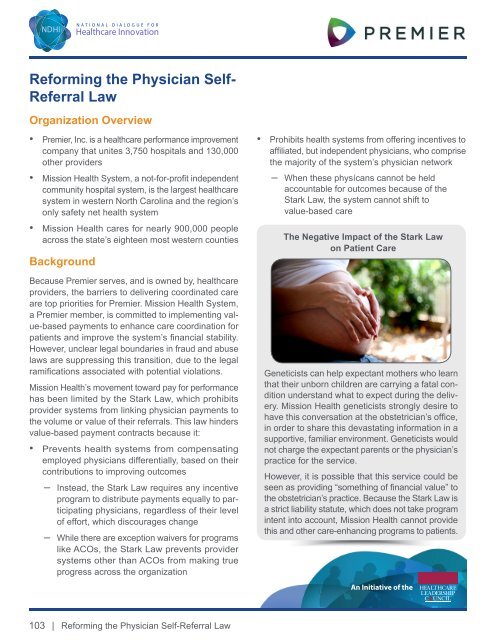VIable
HLCCompendium
HLCCompendium
Create successful ePaper yourself
Turn your PDF publications into a flip-book with our unique Google optimized e-Paper software.
NDHI<br />
NAT IONAL DIALOGUE FOR<br />
Healthcare Innovation<br />
Reforming the Physician Self-<br />
Referral Law<br />
Organization Overview<br />
• Premier, Inc. is a healthcare performance improvement<br />
company that unites 3,750 hospitals and 130,000<br />
other providers<br />
• Mission Health System, a not-for-profit independent<br />
community hospital system, is the largest healthcare<br />
system in western North Carolina and the region’s<br />
only safety net health system<br />
• Mission Health cares for nearly 900,000 people<br />
across the state’s eighteen most western counties<br />
Background<br />
Because Premier serves, and is owned by, healthcare<br />
providers, the barriers to delivering coordinated care<br />
are top priorities for Premier. Mission Health System,<br />
a Premier member, is committed to implementing value-based<br />
payments to enhance care coordination for<br />
patients and improve the system’s financial stability.<br />
However, unclear legal boundaries in fraud and abuse<br />
laws are suppressing this transition, due to the legal<br />
ramifications associated with potential violations.<br />
Mission Health’s movement toward pay for performance<br />
has been limited by the Stark Law, which prohibits<br />
provider systems from linking physician payments to<br />
the volume or value of their referrals. This law hinders<br />
value-based payment contracts because it:<br />
• Prevents health systems from compensating<br />
employed physicians differentially, based on their<br />
contributions to improving outcomes<br />
––<br />
Instead, the Stark Law requires any incentive<br />
program to distribute payments equally to participating<br />
physicians, regardless of their level<br />
of effort, which discourages change<br />
––<br />
While there are exception waivers for programs<br />
like ACOs, the Stark Law prevents provider<br />
systems other than ACOs from making true<br />
progress across the organization<br />
• Prohibits health systems from offering incentives to<br />
affiliated, but independent physicians, who comprise<br />
the majority of the system’s physician network<br />
––<br />
When these physícans cannot be held<br />
accountable for outcomes because of the<br />
Stark Law, the system cannot shift to<br />
value-based care<br />
The Negative Impact of the Stark Law<br />
on Patient Care<br />
Geneticists can help expectant mothers who learn<br />
that their unborn children are carrying a fatal condition<br />
understand what to expect during the delivery.<br />
Mission Health geneticists strongly desire to<br />
have this conversation at the obstetrician’s office,<br />
in order to share this devastating information in a<br />
supportive, familiar environment. Geneticists would<br />
not charge the expectant parents or the physician’s<br />
practice for the service.<br />
However, it is possible that this service could be<br />
seen as providing “something of financial value” to<br />
the obstetrician’s practice. Because the Stark Law is<br />
a strict liability statute, which does not take program<br />
intent into account, Mission Health cannot provide<br />
this and other care-enhancing programs to patients.<br />
An Initiative of the<br />
103 |<br />
Reforming the Physician Self-Referral Law


